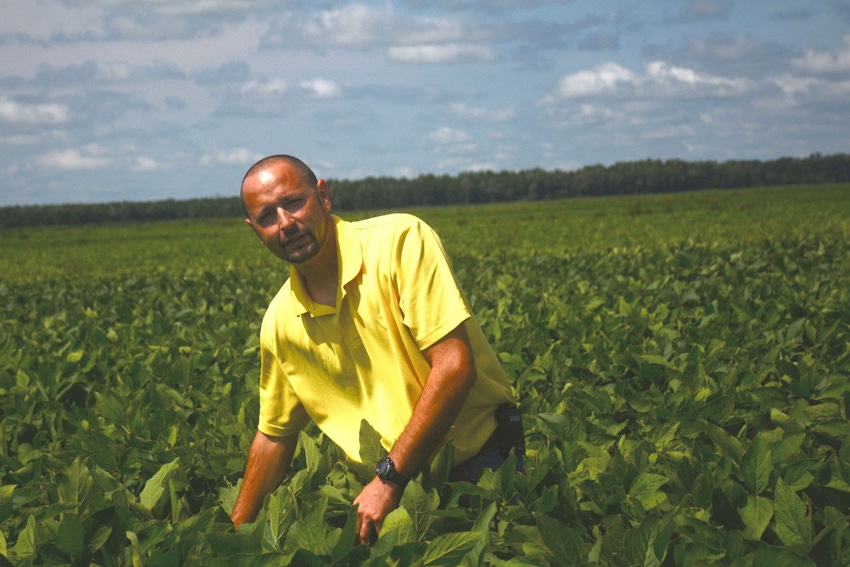
Prior to 2010, Monsanto tested its Group VI and Group VII Asgrow Roundup Ready 2 Xtend soybean varieties in Matthews, Mo., but due to early frost in that part of the country, the company was looking for a seed company on the East Coast to help develop the new varieties that do best in the Southeast.
With this in mind, Monsanto turned to Cherry Farms Seed Company in Columbia, N.C. to plant and test its Group V, VI and VII Asgrow varieties. “Monsanto had trouble a lot of time getting the Group VI and VII varieties they needed in Missouri because that’s not where they are grown. They often couldn’t get the production they needed because of early frost,” explains David Brickhouse, president of Cherry Farms.
Cherry Farms built a completely separate plant to handle the new pre-commercial Asgrow Group VI and Group VII soybean varieties and contracted with local farmer Gene McNutt to produce the pre-commercial varieties on his farm, located right across the road from Cherry Farm’s headquarters on Highway 94 near Columbia.
“It works well for us because we can grow Group IVs to VIIs,” Brickhouse explains. “We have a long planting window and a long harvest window. We’re still harvesting some of the Group VIIs in December.”
Brickhouse explains that McNutt was the ideal farmer to grow the pre-commercial varieties for Cherry Farms and Monsanto. “Gene is a good farmer who pays attention to details,” he says.
McNutt is co-owner of Cherry Farms LLC and is also a partner in Cherry Farms Seed Company. His partner is Ken Cherry, who founded Cherry Farms Seed Company in 1989. In 2015, Cherry sold Cherry Farms Seed to Brickhouse and other investors. Cherry is now mostly retired from Cherry Farms LLC, delegating the management to McNutt. Cherry went into partnership with McNutt in Cherry Farms LLC in 2005.
“Ken Cherry has been retired for two years but he still comes by and gives me guidance and suggestions,” McNutt says. “He left a good slate for me to follow.”
Today, McNutt produces soybeans entirely for Monsanto’s and Cherry Farm’s pre-commercial soybean variety program. McNutt farms a total of 1,200 acres with 500 to 600 acres devoted to pre-commercial soybean varieties and the rest of the acreage swapped out to Black Gold Farms for Irish potatoes.
This year, McNutt is producing 37 different varieties, developed through Monsanto’s soybean breeding process, that may become commercial Asgrow Roundup Ready 2 Xtend varieties. Of those varieties, Monsanto may choose to only proceed with five of the 37 pre-commercial varieties. Most of the varieties are segregated on two-acre plots on McNutt’s farm.
Cherry Farms handles the planting for McNutt while McNutt takes care of land preparation, spraying and other management tasks until harvest. It is at harvest where attention to detail is critical.
McNutt uses two combines to harvest the pre-commercial varieties and the combines have to be cleaned before each separate variety is picked to ensure purity and no mixing of the varieties.
“Not that many farmers are willing to clean a combine after every two acres. It gets tedious but you do what you have to do and keep going,” McNutt says.
McNutt gets an economic advantage for his pre-commercial variety work. “He’s paid a little more than the average farmer because he’s assuming risk. When you have 37 different varieties that you’ve never seen before, you never know what you’re going to get,” Brickhouse explains.
All 37 of the lines are pre-commercial Roundup Ready 2 Xtend varieties with exclusive Asgrow genetics, ranging from Group V to Group VII. Both Brickhouse and McNutt said striving for top yields is the primary aim of the program. Seed purity is also critical.
“High fertility is important because we are trying to produce yields out of small acres,” McNutt says. Cherry Farms requires fungicides on all of the acreage and McNutt constantly scouts for insects and applies insecticides when needed.
McNutt says he really enjoys working in the pre-commercial variety program because it allows him to see the latest technology before it becomes commercially available. “You can compare the new traits of the new varieties with the traits that have already come out. This builds your knowledge base for what works and what doesn’t,” he says.
He really likes the dicamba and glyphosate tolerance in the Roundup Ready 2 Xtend varieties. “Nothing makes your eye sorer than seeing those weeds in the field,” he said.
About the Author(s)
You May Also Like






